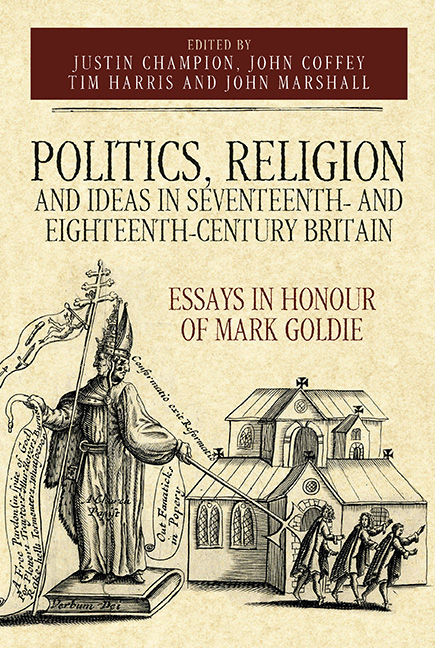 Politics, Religion and Ideas in Seventeenth- and Eighteenth-Century Britain
Politics, Religion and Ideas in Seventeenth- and Eighteenth-Century Britain Book contents
- Frontmatter
- Dedication
- Contents
- Notes on Contributors
- Acknowledgements
- Notes on Text
- Abbreviations
- Introduction: Mark Goldie – An Appreciation
- 1 Constitutional Royalism Reconsidered: Myth or Reality?
- 2 Teaching Political Thought in the Restoration Divinity Faculty: Avant-Garde Episcopacy, the Two Kingdoms and Christian Liberty
- 3 Violence, Protest and Resistance: Marvell and the Experience of Dissent after 1670
- 4 Bulstrode Whitelocke and the Limits of Puritan Politics in Restoration England
- 5 The Assassination of Archbishop Sharp: Religious Violence and Martyrdom in Restoration Scotland
- 6 Compassing Allegiance: Sir George Mackenzie and Restoration Scottish Royalism
- 7 Corruption and Regeneration in the Political Imagination of John Locke
- 8 Locke the Censor, Locke the Anti-Censor
- 9 London, Locke and 1690s Provisions for the Poor in Context: Beggars, Spinners and Slaves
- 10 The Reception of Locke's Politics: Locke in the République des Lettres
- 11 Court Culture and Godly Monarchy: Henry Purcell and Sir Charles Sedley's 1692 Birthday Ode for Mary II
- 12 Thanksgivings and the Signs of the Times: The Apocalypse in the Long Eighteenth Century
- 13 The ‘Secret Reformation‘ and the Origins of the Scottish Catholic Enlightenment
- 14 The Surprising Lineage of Useful Knowledge
- 15 The Vicissitudes of Innovation: Confessional Politics, the State and Philosophy in Early Modern England
- A Bibliography of the Writings of Mark Goldie
- Index
- Studies in Early Modern Cultural, Political and Social History
- Tabula Gratulatoria
7 - Corruption and Regeneration in the Political Imagination of John Locke
Published online by Cambridge University Press: 12 October 2019
- Frontmatter
- Dedication
- Contents
- Notes on Contributors
- Acknowledgements
- Notes on Text
- Abbreviations
- Introduction: Mark Goldie – An Appreciation
- 1 Constitutional Royalism Reconsidered: Myth or Reality?
- 2 Teaching Political Thought in the Restoration Divinity Faculty: Avant-Garde Episcopacy, the Two Kingdoms and Christian Liberty
- 3 Violence, Protest and Resistance: Marvell and the Experience of Dissent after 1670
- 4 Bulstrode Whitelocke and the Limits of Puritan Politics in Restoration England
- 5 The Assassination of Archbishop Sharp: Religious Violence and Martyrdom in Restoration Scotland
- 6 Compassing Allegiance: Sir George Mackenzie and Restoration Scottish Royalism
- 7 Corruption and Regeneration in the Political Imagination of John Locke
- 8 Locke the Censor, Locke the Anti-Censor
- 9 London, Locke and 1690s Provisions for the Poor in Context: Beggars, Spinners and Slaves
- 10 The Reception of Locke's Politics: Locke in the République des Lettres
- 11 Court Culture and Godly Monarchy: Henry Purcell and Sir Charles Sedley's 1692 Birthday Ode for Mary II
- 12 Thanksgivings and the Signs of the Times: The Apocalypse in the Long Eighteenth Century
- 13 The ‘Secret Reformation‘ and the Origins of the Scottish Catholic Enlightenment
- 14 The Surprising Lineage of Useful Knowledge
- 15 The Vicissitudes of Innovation: Confessional Politics, the State and Philosophy in Early Modern England
- A Bibliography of the Writings of Mark Goldie
- Index
- Studies in Early Modern Cultural, Political and Social History
- Tabula Gratulatoria
Summary
On the last morning of his life, John Locke asked to be carried once more into his study. There he sat and dozed in an easy chair, fading and gasping out his life, in his lodgings at the Mashams’ in Essex on Saturday, 28 October 1704. One of his fervent hopes in his final months was that the attention of educated Europe would be captured by the vision of politics set out, in its initial form, in the Two Treatises of Government of 1689 and Du Gouvernement Civil of 1691. This vision had been of relatively little public importance during his lifetime. Now it was carefully revised for republication in English and French; instructions for posthumous editions were in hand. Two days earlier, on 26 October, Locke appears to have invited Pierre Coste to his room: he wished to secure a new French translation from Coste, the Huguenot refugee who had joined the Masham household in 1697. Three days earlier, Locke had still found the strength to concentrate on his manuscripts, and had amended his instructions regarding what should be published posthumously, what left unpublished. He had addressed the instructions to Peter King, an aspiring lawyer, his cousin and executor.
According to Locke's directions, amongst the papers King would find, for instance, Locke's ‘discourse of Seeing all things in god’, his refutation of Nicolas Malebranche's position. Locke was satisfied he had shown Malebranche's ‘to be a very groundless opinion’, and friends equally satisfied had pressed him to publish. Yet he had decided against publication both because he was ‘noe freind to controversie’ and because Malebranche's was ‘an opinion that spreads not’ but was ‘like to die of itself or at least to doe noe great harm’. The key to understanding Locke's decision is that it was neither the difficulties involved nor the merits of his case against Malebranche's theory that were uppermost in his mind; rather, what concerned Locke was the fate of European civilisation. His instructions are a litmus test of his appraisal of risks to future generations. Malebranche's theory appeared to pose no risk to them.
- Type
- Chapter
- Information
- Politics, Religion and Ideas in Seventeenth- and Eighteenth-Century BritainEssays in Honour of Mark Goldie, pp. 141 - 160Publisher: Boydell & BrewerPrint publication year: 2019


